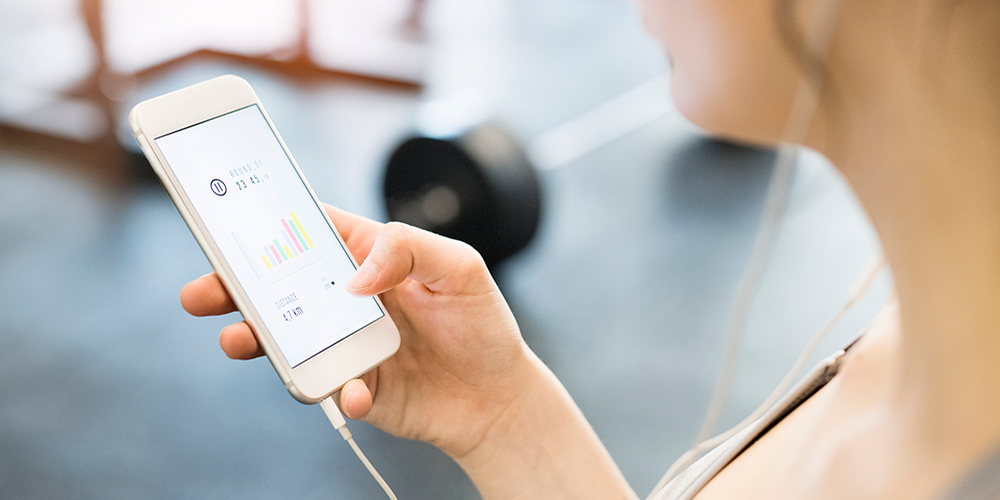
So Many Apps, So Little Time: Which Fitness & Diet App is Best for You?
Share
Sticking to diet, fitness or other wellness goals can be made simpler by using some of the many popular apps on the market. A well-designed app can help you stay motivated, track progress, and provide reinforcement for even the smallest successes. With thousands of apps available, the hardest part is figuring out which ones are best for you.
The majority of diet and fitness tracking apps are not regulated by a governing agency, such as the Food and Drug Administration, unless it's considered a medical device. Be prepared for some trial and error in testing out apps; but before you get to the road-test stage, keep the following tips in mind.
Essential Features of Quality Apps
Key features to look for in an app designed to track eating and exercise behavior:
user-friendly, intuitive platform that displays data that is relevant for you;
ability to set a goal and get visual or other feedback (e.g., alerts, stickers) so you can see your progress and feel a sense of achievement;
tools for positive reinforcement/accountability (e.g., social networks, contests);
accuracy of data entered and how it is tabulated, including calories, nutrients, steps, miles, etc.
Apps that monitor dietary intake of macro and micronutrients (e.g., calories, protein, fat, sodium, sugar, vitamins etc.) should have a comprehensive food database. Make sure the database includes foods you typically eat.
A physical activity app is best if it accurately tracks the activity you enjoy and will help you stick with it over time. For most people, it may be helpful to find a fitness app that allows you to track a variety of activities (e.g., walking, weight training, or swimming) and encourages you to increase total movement each day. Others may want to gather robust data for more intense training such as distance running. There are also many apps that will take you through a basic workout right on your phone. As your fitness level improves, you can always change or upgrade the app.
Quick Tips for Choosing a Reliable App
1) When viewing an app in the iTunes or Android store:
Read reviews to see if the app performs as advertised.
Look at the date the developer updated the app. It should be updated regularly, at least within the last 3 months.
2) Visit the developer website for the app:
Look at the developer team. Ideally, you want to see medical advisors, not just engineers, with appropriate health/medical credentials
3) Be realistic about what is promised:
Steer clear of apps that claim to diagnose or treat as well as those that suggest you take a certain drug or supplement, or encourage restrictive diets or excessive exercise.
Resources
"Best Health and Fitness Apps of 2018." https://www.healthline.com/health/fitness-exercise/top-iphone-android-apps
"Best Diet/ Nutrition Apps for 2018" https://wa-health.kaiserpermanente.org/best-diet-apps/
"Forbes Best List of Fitness Apps for 2017." https://www.forbes.com/sites/leebelltech/2017/12/06/best-health-and-fitness-apps-of-2017/#793a81616fd7
"Get Mobile, Get Healthy: The Appification of Health & Fitness" https://visual.ly/community/infographic/health/get-mobile-get-healthy-appification-health-fitness
"Health and Fitness App Development; Must Have Features." https://www.mobindustry.net/health-and-fitness-app-development-must-have-features/
The majority of diet and fitness tracking apps are not regulated by a governing agency, such as the Food and Drug Administration, unless it's considered a medical device. Be prepared for some trial and error in testing out apps; but before you get to the road-test stage, keep the following tips in mind.
Essential Features of Quality Apps
Key features to look for in an app designed to track eating and exercise behavior:
user-friendly, intuitive platform that displays data that is relevant for you;
ability to set a goal and get visual or other feedback (e.g., alerts, stickers) so you can see your progress and feel a sense of achievement;
tools for positive reinforcement/accountability (e.g., social networks, contests);
accuracy of data entered and how it is tabulated, including calories, nutrients, steps, miles, etc.
Apps that monitor dietary intake of macro and micronutrients (e.g., calories, protein, fat, sodium, sugar, vitamins etc.) should have a comprehensive food database. Make sure the database includes foods you typically eat.
A physical activity app is best if it accurately tracks the activity you enjoy and will help you stick with it over time. For most people, it may be helpful to find a fitness app that allows you to track a variety of activities (e.g., walking, weight training, or swimming) and encourages you to increase total movement each day. Others may want to gather robust data for more intense training such as distance running. There are also many apps that will take you through a basic workout right on your phone. As your fitness level improves, you can always change or upgrade the app.
Quick Tips for Choosing a Reliable App
1) When viewing an app in the iTunes or Android store:
Read reviews to see if the app performs as advertised.
Look at the date the developer updated the app. It should be updated regularly, at least within the last 3 months.
2) Visit the developer website for the app:
Look at the developer team. Ideally, you want to see medical advisors, not just engineers, with appropriate health/medical credentials
3) Be realistic about what is promised:
Steer clear of apps that claim to diagnose or treat as well as those that suggest you take a certain drug or supplement, or encourage restrictive diets or excessive exercise.
Resources
"Best Health and Fitness Apps of 2018." https://www.healthline.com/health/fitness-exercise/top-iphone-android-apps
"Best Diet/ Nutrition Apps for 2018" https://wa-health.kaiserpermanente.org/best-diet-apps/
"Forbes Best List of Fitness Apps for 2017." https://www.forbes.com/sites/leebelltech/2017/12/06/best-health-and-fitness-apps-of-2017/#793a81616fd7
"Get Mobile, Get Healthy: The Appification of Health & Fitness" https://visual.ly/community/infographic/health/get-mobile-get-healthy-appification-health-fitness
"Health and Fitness App Development; Must Have Features." https://www.mobindustry.net/health-and-fitness-app-development-must-have-features/
